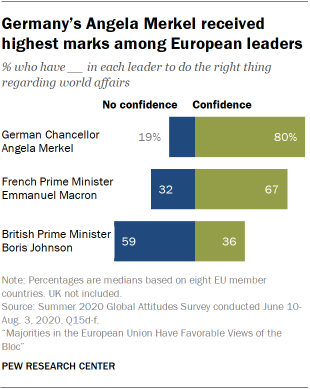
The survey asked about confidence in two leaders of EU member countries and UK Prime Minister Boris Johnson to do the right thing regarding world affairs. Of these leaders, German Chancellor Angela Merkel and French President Emmanuel Macron received generally positive ratings: A median of 80% across eight EU member states had confidence in Merkel, and 67% said the same of Macron. (The poll was conducted over the summer, prior to the latest surge in European cases and additional government restrictions.)
Johnson received somewhat lower marks from the same EU countries: A median of 36% said they had confidence in Johnson to do the right thing in world affairs, while 59% had no confidence in the British leader.
Still, Johnson fared somewhat better across these eight EU countries than other non-EU leaders, including Russian President Vladimir Putin (a median of 23% across these eight countries were confident in Putin), Chinese President Xi Jinping (20%) and U.S. President Donald Trump (13%).
Merkel trusted across Europe
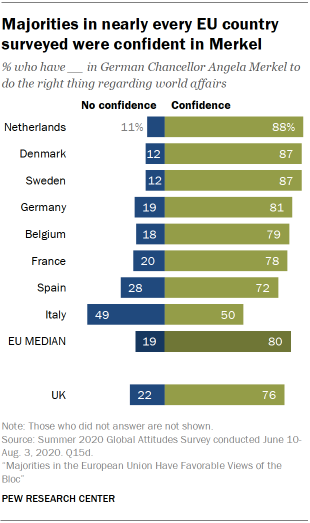
Many across the EU countries surveyed had confidence in German Chancellor Angela Merkel to do the right thing regarding world affairs, including almost nine-in-ten in the Netherlands, Denmark and Sweden.
In every country except for Italy, majorities had confidence in Merkel. Italians, however, were split in their assessment: 50% said they had confidence while 49% said they had no confidence in her leadership on global affairs.
In the UK, Britons were very confident in Merkel: About three-quarters (76%) trusted the leader to do the right thing.
In general, confidence in Merkel has increased or stayed roughly the same across several European countries since this question was first asked. In Sweden, for example, the share who expressed confidence in Merkel increased from 65% in 2007 to 87% in this year’s survey. (In 2007, 24% of Swedes did not offer an opinion.)
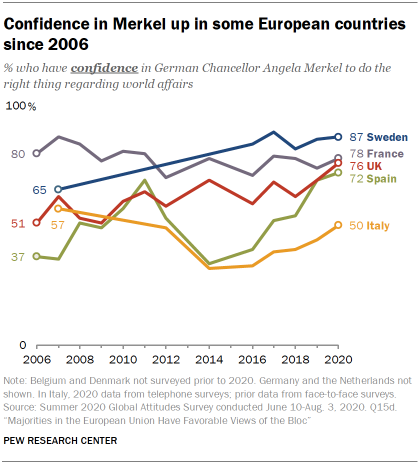
Confidence in Merkel has increased by double digits in Spain (up 35 percentage points) and the UK (+25 points) since 2006. This year, in both countries, confidence in Merkel stood at its highest level on record. Italy is the only European country where confidence in Merkel declined.
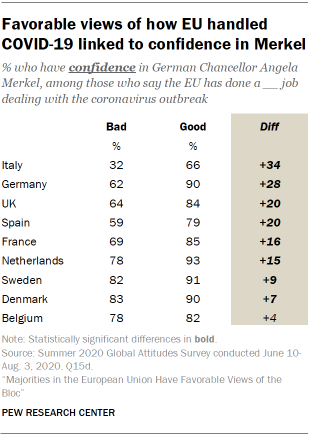
In almost every European country surveyed this summer, confidence in Merkel was linked to people’s perceptions of how well the EU did handling COVID-19. For example, in Italy, those who thought the EU had done a good job dealing with the outbreak were more than twice as likely to say they had confidence in Merkel than those who thought the EU did a bad job handling the pandemic – 66% vs. 32%, respectively.
In many European countries surveyed, those with more education were more likely to have confidence in Merkel. For example, in Italy, 64% of those with a postsecondary education or above were confident in Merkel’s ability to do the right thing, while 47% of those with a secondary education or below said the same.
Outside of Germany, ideology often shaped views of Merkel. In Italy, the UK and Sweden, those who placed themselves on the left had more confidence in Merkel than those who placed themselves on the right. This pattern was reversed in France and Spain, where those on the right were more confident in Merkel than those on the left.
Macron trusted across much of the EU
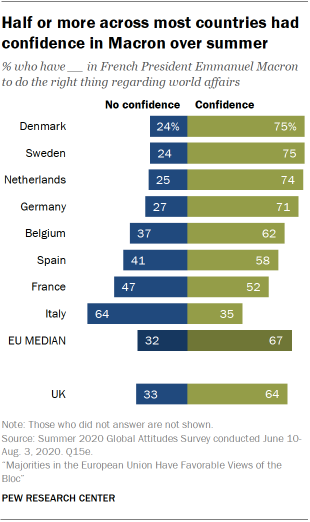
French President Emmanuel Macron received generally positive ratings across the eight EU countries surveyed and the UK. An EU median of 67% had confidence in the French leader to do the right thing regarding world affairs, but this ranged from a low of 35% in Italy to a high of 75% in both Denmark and Sweden.
In the UK, people were more confident than not in the French president. Roughly two-thirds had confidence in Macron to do the right thing, while one-third said the opposite.
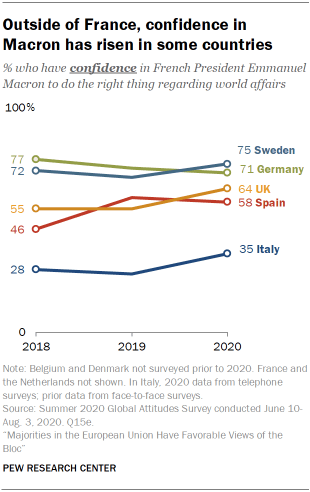
Confidence in Macron has risen in some European countries since this question was first asked in 2018. In Spain, for example, positive ratings increased from 46% in 2018 to 58% in 2020, though they are largely unchanged since last year. Confidence in Macron also increased in the UK (by 9 percentage points) and Italy (+7 points) over the past two years.
In Germany, however, confidence in the French leader decreased 6 points since 2018, though it changed little since last year.
Those who said the EU did a good job dealing with the coronavirus outbreak were more likely to have confidence in Macron than those who evaluated the organization’s response more negatively. In the Netherlands, for example, 81% who said the EU handled COVID-19 well were confident in Macron, compared with 61% who said the EU had done a bad job.
And, as was the case with Merkel, those with at least a postsecondary education were more likely to express confidence in Macron than those with a secondary education or less in several countries.
Mixed views of Boris Johnson across EU countries
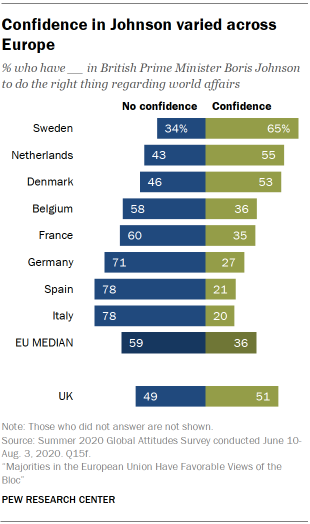
Across the eight EU countries surveyed over the summer, a median of 36% said they had confidence in British Prime Minister Boris Johnson to do the right thing regarding world affairs. Positive assessments of the prime minister ranged from 20% in Italy to 65% in Sweden.
In five of the eight EU countries polled, majorities said they had no confidence in Johnson. Roughly three-quarters (78%) of Spaniards and Italians held this view.
In several of the countries surveyed, those who placed themselves on the right of the ideological spectrum were more likely to have confidence in Johnson than those who placed themselves on the left.
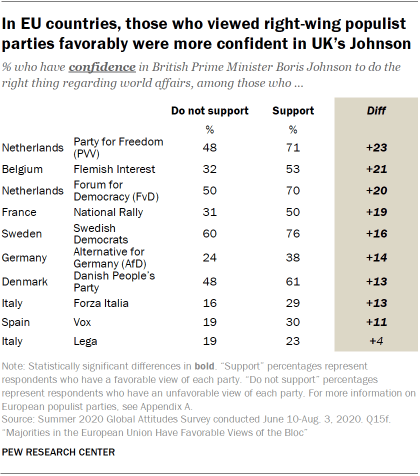
Right-wing populist supporters were also more likely to express confidence in Johnson than nonsupporters. In the Netherlands, for example, those with a favorable view of the Party for Freedom (PVV) were 23 percentage points more likely than those with an unfavorable view of the party to say they had confidence in Johnson.




